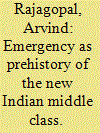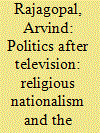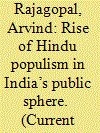|
|
|
Sort Order |
|
|
|
Items / Page
|
|
|
|
|
|
|
| Srl | Item |
| 1 |
ID:
106497


|
|
|
|
|
| Publication |
2011.
|
| Summary/Abstract |
Recent accounts of the National Emergency of 1975-1977 concur that the deviations it represented, while genuine, did not represent any fundamental change on the part of the Indian state, and that the period offers little distinct insight on the post-independence period as a whole. This paper seeks to argue, to the contrary, that the Emergency was a watershed in post-independence history. With its ban on dissent and suspension of constitutional rights, the Emergency sought to suppress all political disturbances to governance. By doing so, it forefronted the problems of postcolonial politics in at least three respects. First, the Emergency demonstrated that coercion was inextricably combined with consent in state-led development. Second, this led to a heavy reliance on practices of communication to redefine coercion and to stage popular consent. Third, in the process, the boundaries of the political were reinforced, emphasizing the friend/enemy difference fundamental to politics. Governance in the aftermath of the Emergency placed an overt reliance on consent over coercion, but in ways that are themselves significant. Categories of culture and community, and related forms of social distinction, gained in importance over earlier developmental distinctions premised on an authoritarian relationship between state and the people. The change meant a shift away from the Nehruvian focus on the economy as the crucial arena of nation-building, involving labour as the key modality of citizenship. Instead, culture and community became the categories that gained political salience in the period of economic liberalization. The mass media were central to this redefinition of the political, multiplying in size and reach, and acquiring market-sensitive forms of address couched in the rhetoric of individual choice. These events, I suggest, are critical to understanding the formation of the new middle class in India, as a category that increasingly defines itself through cultural and consumerist forms of identity, and is less identified with the state.
|
|
|
|
|
|
|
|
|
|
|
|
|
|
|
|
| 2 |
ID:
049310


|
|
|
|
|
| Publication |
Cambridge, Cambridge University Press, 2001.
|
| Description |
viii, 393p.
|
| Standard Number |
0521640539
|
|
|
|
|
|
|
|
|
|
|
|
Copies: C:1/I:0,R:0,Q:0
Circulation
| Accession# | Call# | Current Location | Status | Policy | Location |
| 044600 | 306.0954/RAJ 044600 | Main | On Shelf | General | |
|
|
|
|
| 3 |
ID:
144386


|
|
|
|
|
| Summary/Abstract |
The public sphere of debate and discussion predicated on transparency has given way to a public sphere of image and spectacle.” Sixth in a series on public spheres around the world.
|
|
|
|
|
|
|
|
|
|
|
|
|
|
|
|
|
|
|
|
|